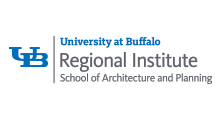About the Rudy Bruner Center (RBC)
The Rudy Bruner Center for Urban Excellence is a research and educational center at the University at Buffalo’s School of Architecture and Planning focused on innovative thinking and conversation about the role of design in the complex process of city making.
Supported by a $5 million endowed fund from the Bruner Foundation, the RBC will serve as a living resource and tool for research, scholarship and practice related to urban development and the process of enabling beautiful, just and resilient places. The center operates in partnership with the UB Regional Institute, a research center of the School of Architecture and Planning, and with the UB Libraries.
“Bruner Foundation’s historic $5M gift will support new center at UB.”
The center builds on the legacy of the Rudy Bruner Award for Urban Excellence (RBA), a national design award founded in 1985 and named after Rudy Bruner. Until its final awards in 2019, the RBA recognized and thoroughly documented 88 transformative places in the United States that have contributed to the economic, environmental and social vitality of communities.
RBA resources will continue to be accessible via the RBA website until it is migrated to the Rudy Bruner Center site in Summer 2024.
Both the transition of the RBA and the development of the center are the culmination of a decades-long partnership between Simeon Bruner, founding principal of Boston-based Bruner/Cott Architects, and Robert G. Shibley, longtime dean of UB’s School of Architecture and Planning. Shibley recently announced he will step down from his leadership post to resume his faculty position as SUNY Distinguished Professor and lead the center as the Rudy Bruner Chair in Urban Excellence.
A long time Partnership

“The Rudy Bruner Award Collection is packed with best practices on urban placemaking across the continental United States. Engaging faculty, students and partners vested in community and professional practices, the Rudy Bruner Center will mine the RBA for theories of practice and an expanded vocabulary for research and teaching that speaks to the full complexity of urban placemaking.”
Robert G. Shibley, inaugural director of the RBC and Rudy Bruner Chair in Urban Excellence
“The transition from an active awards program to a research institution is an interesting challenge. Bob Shibley was instrumental in designing the RBA and has contributed to every round. We are confident that he will use the trove of information we have developed over the years to continue to explore creative solutions to the complex problems of placemaking.”
Simeon Bruner, founding principal of Boston-based Bruner/Cott Architects, and founder of the Rudy Bruner Award for Urban Excellence
Frequently Asked Questions
What is the mission and vision of the Rudy Bruner Center for Urban Excellence?
Mission: The Rudy Bruner Center for Urban Excellence promotes innovative thinking and conversation about the role of design in cities. Offering a platform for ongoing inquiry and exchange about the built environment and cities, the RBC serves as a resource for anyone interested in urban development. The center will engage a broad and diverse audience of educators, practitioners, and students through publications referencing the RBA Collection, awards, research, and educational programming.
Vision: The RBC seeks out and shares the stories of creative and inspiring urban development to increase understanding of the complex process of enabling beautiful, just, and resilient places, developing additional research, education, and award programs consistent with its mission, vision, and principles.
Will the Rudy Bruner Award continue?
The RBA begins a new chapter as a curated collection of best practices in urban placemaking and a platform for new research on the role of design in cities. Until its final awards in 2019, the RBA recognized and thoroughly documented 88 transformative places in the United States that have contributed to the economic, environmental and social vitality of communities. The transition marks the culmination of a decades-long partnership with the University and Dean Robert Shibley and vision for the RBA to be a living resource and tool for research, scholarship, and practice. RBA resources will continue to be accessible via the RBA website until the Rudy Bruner Center website is unveiled in Summer 2024.
What is the leadership structure of the RBC?
The Rudy Bruner Center will draw its leadership from Robert G. Shibley, FAIA and FAICP. Shibley is a leading scholar on urban placemaking with more than 50 years of teaching, research and critical practice as a faculty member and administrator of the School of Architecture and Planning. Learn more about his legacy and impact:
The RBC will be directed in collaboration with a new Rudy Bruner Fellow and Director of Research to be announced in early Summer 2024.
The center also will work with UB Libraries to improve access to and further develop and curate the Collection.
What is the curatorial scope of the RBA Collection, and how can I access its resources?
The materials and documentation compiled over the Rudy Bruner Award’s nearly 40-year existence will be maintained as the Rudy Bruner Award Collection, to be housed within the University at Buffalo Libraries. The Center will draw upon the Collection as a platform for transformative research, teaching, and professional engagement. The Collection aims to improve access to and curate the repository of papers, books, program materials and digital archives on urban excellence, serving as a resource for anyone interested in architecture and urban planning, igniting new research, discussion, advocacy and ideas and solutions.
RBA resources will continue to be accessible via the RBA website until the Center website is launched this Summer.
What are the research and educational priorities of the RBC?
The Rudy Bruner Center’s work will address the complex web of problems associated with rapid urbanization, with more than 278 million people in the United States now living in urban areas. It will vastly increase the possibilities for UB and all other interested parties to do sponsored work, including, but not limited to, work on learning through case studies, dozens of typology trends, and innovative urban development finance research.
The center’s research and engagement priorities include establishing an educational version of the RBA through case method teaching and the distillation of best practices and metrics in urban excellence through assessments of the 950 self-reported case histories and 88 award-winning projects across three decades of of the RBA. The diverse RBA histories will also drive new research on urban finance and governance, revitalization models for distressed communities, the management of urban sprawl and suburban and rural development, and fundamental examination of the value of design in placemaking. In addition, the Center will focus on best practices in urban placemaking education as it develops educational materials supporting the Center mission.
Guiding principles of the Rudy Bruner Center for Urban Excellence:
- A Confluence of Strategies. Explore urban excellence as quality design through vision and leadership, collaborative partnerships among various disciplines and professions, engaging and empowering people affected by the place, anchoring in place, and leveraging design.
- Curation. Curate the RBA Collection through maintenance, new programming, material additions, and the optimization of accessibility to the collections at the UB Libraries.
- Multiple Perspectives. Use the Center and its programs to sustain a diverse conversation on the nature of urban excellence. The goal is not to conclude the discussion, but instead ensure it continues with an ethic of inclusion across multiple perspectives, professions, and disciplines.
- Sustained Engagement. Sustain the community of RBA engagers, including the past selection committee members, award winners, and organizational partners through the Web, social media, video, publishing programs, convening conversations, and educational and research programs and partnerships.
- Design. Design is a fundamental organizing principle of the Center’s conversations that explore urban environments responsive to the needs, constituencies, and cultures of places.
- Storytelling. Employ the power of visual and narrative storytelling to offer persuasive examples of design excellence and lessons learned.
- Safe Spaces. Seek to convene in safe spaces to discuss innovative solutions to design and data-informed urban conditions.
How do I stay connected to and follow the activities of the RBC?
- Web: A new website for the Rudy Bruner Center for Urban Excellence that includes educational resources and related research and publications is in development and will launch in Summer 2024. In the meantime, please visit this webpage for news and updates. RBA resources will continue to be accessible via the RBA website until the completion of the RBA Collection, to be unveiled in Summer 2024.
- Social media: A new platform of social media channels is in development for the Rudy Bruner Center. In the meantime, please follow the Rudy Bruner Award on LinkedIn, Facebook and Twitter for news and announcements about the RBC, the RBA Collection and the center’s developing educational and research programs.
Rudy Bruner Center for Urban Excellence Team

Robert Shibley, FAIA, FAICP
Rudy Bruner Chair in Urban Excellence | Rudy Bruner Center for Urban Excellence
Senior Fellow | UB Regional Institute
SUNY Distinguished Professor | School of Architecture and Planning
rshibley@buffalo.edu

Camden Miller, PhD
Director of Operations and Project Management | Rudy Bruner Center for Urban Excellence
Clinical Assistant Professor | Department of Urban and Regional Planning
camdenmi@buffalo.edu

Conrad Kickert, PhD
Director of Programs | Rudy Bruner Center for Urban Excellence
Associate Professor | Department of Architecture
kickert@buffalo.edu

Matthew Roland, AICP
Rudy Bruner Fellow| Rudy Bruner Center for Urban Excellence
Clinical Assistant Professor | Department of Urban and Regional Planning
msroland@buffalo.edu

Kielee Clement
Graduate Research Assistant | Rudy Bruner Center for Urban Excellence
kieleecl@buffalo.edu

Carl Siegel
Bruner Collections Manager | Rudy Bruner Center for Urban Excellence
cjsiegel@buffalo.edu

Rose Orcutt
Architecture and Planning Librarian | Rudy Bruner Center for Urban Excellence
rmorcutt@buffalo.edu
Contact us:
We welcome all inquiries and questions about the transition of the RBA and the future of the Rudy Bruner Center for Urban Excellence.
Camden Miller, PhD
Director of Operations
camdenmi@buffalo.edu
Robert G. Shibley, FAIA, FAICP
SUNY Distinguished Professor and
Rudy Bruner Chair in Urban Excellence
rshibley@buffalo.edu
The School of Architecture and Planning’s Rudy Bruner Center for Urban Excellence will operate in partnership with the UB Regional Institute’s offices at the UB Downtown Gateway building beginning Summer 2023.
Project Partners





